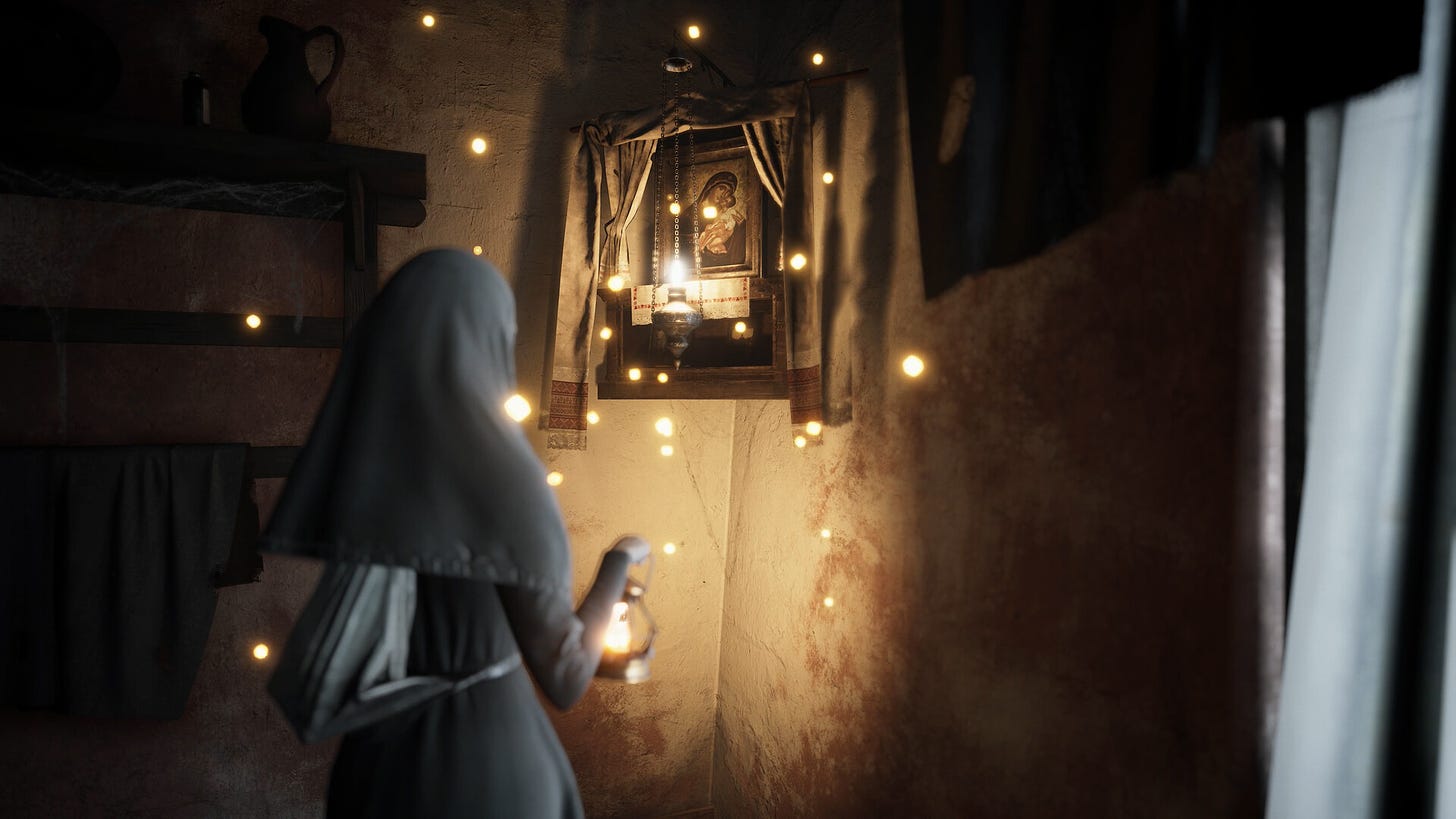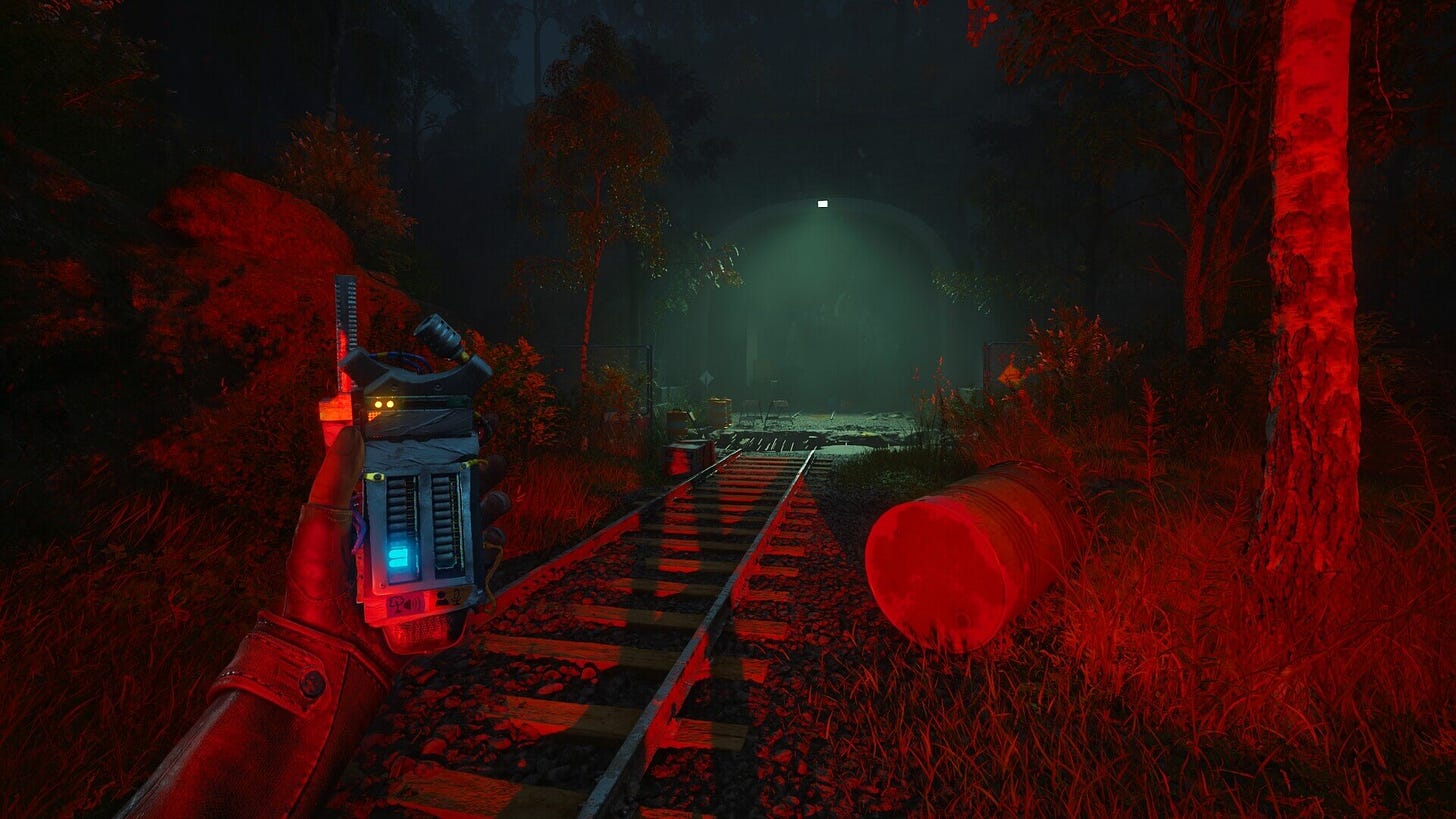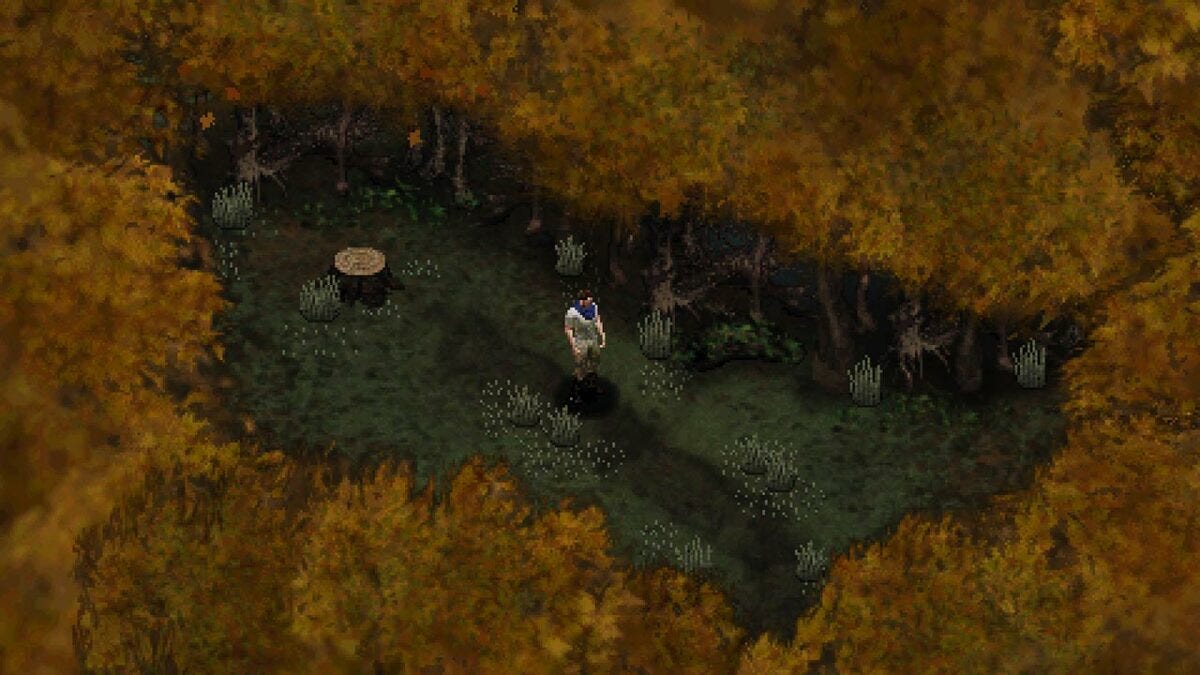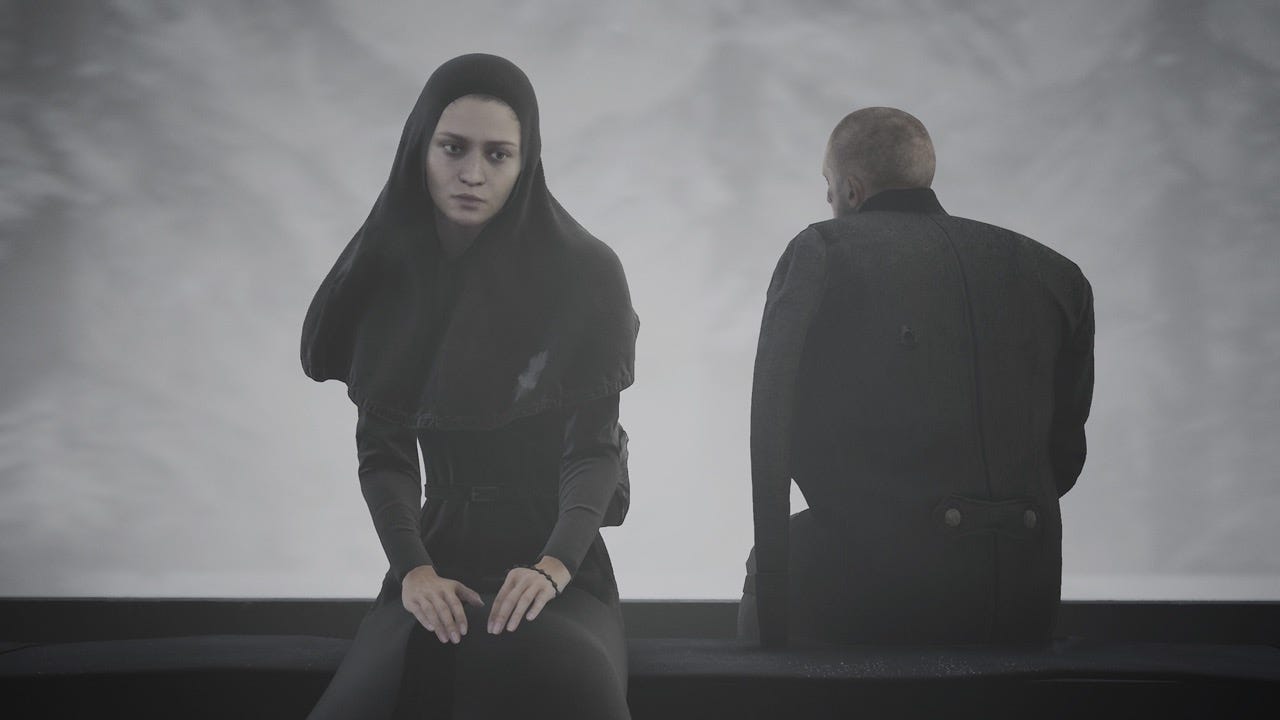Dear hopeful reader,
I grew up on horror, for better or worse.
I remember feeling troubled and transfixed by “Lover’s Vow” from Tales from the Darkside: The Movie after watching it too young. I remember getting lost in the spine-chilling pages of R. L. Stine’s Goosebumps and Fear Street as a tween.
I even remember killing my first zombie in the original Resident Evil, awkwardly navigating the fixed camera angles and tank controls, being both a terrified and proud six-year-old.
Being exposed to horror so young, it’s no wonder I developed a personal superstition. Before bedtime I would gather my plush toys and make sure they would surround me protectively, especially my back side; for if not, a bogeyman would drag me away.
For years I would continue this nightly ritual, protecting my sides and back—either with the plushies or a wall surface of sorts. I finally overcame the fear as a young adult.
Today I’m thinking: for better. I’m mature and resilient enough to explore horror in literature, cinema, or gaming. How it evolved! What was once a campy, cheesy genre à la 80s slashers developed into something that delves into human experiences more deeply, more darkly.
It’s not the insane clowns or inhuman serial killers or flesh-eating barracudas that are frightening; that’s surface-level scares. It’s what we could live through to see another day, it’s what would make us fall to our knees, crying out in helplessness.
Take Leigh Whannell’s The Invisible Man. It’s not the fact that the ex-boyfriend can become invisible that’s scary; it’s the physical and psychological harm he can cause again and again, unseen by others. It’s the disbelief in the victim, the resulting self-questioning and isolation. That’s especially terrifying because it happens in real life.
Or consider The Last of Us Part II. The runners, clickers, and bloaters have nothing on the complex feelings of grief and revenge, nothing on the trauma reactions and impulses, the viciously cyclical violence ending in more bloodshed and loss, never ending. (Well, maybe the Rat King—that abomination is a heart attack.)
Horror reflects the deepest, darkest parts of our hubris, frailty, and vulnerability. Horror moves us to sorrow or fury, compels us to empathize with a predicament unfamiliar to us or relate to others in a shared unfortunate circumstance. Horror devastates. Horror also catharizes.
Horror in gaming is even more palpable as you play the protagonist of the story. Seeing what they’re seeing, feeling what they’re feeling—they blend with you and you with them. You become them in devastation, and maybe catharsis.
Today I’m sharing four recent video game horror releases with story lines that will surely devastate the protagonists you play, and therefore you, this darkening season.
#1: A Quiet Place: The Road Ahead
From the developers of the movielike, emotive stealth games Remothered: Tormented Fathers and Remothered: Broken Porcelain, reminiscent of the Clock Tower series, comes A Quiet Place: The Road Ahead.
In A Quiet Place—which was inspired by the titular praised movie franchise—you play as Alex Taylor, a pregnant woman with asthma, who tragically loses everyone she loves to blind alien creatures with acute hearing and echolocation. The only way to evade them is to be quieter than the noise of your surroundings.
During the perilous journey of finding essential resources to survive and a safe haven to thrive in, Alex must reconcile with the fact that she’ll never embrace her loved ones again while finding the courage and determination to not give up, but to go on for herself, for her baby.
A Quiet Place is experienced through a first-person perspective. The few times you see Alex is when she looks at her pocket mirror with a picture of her parents. Otherwise you witness her hands shaking, her body—completely spent—falling to the ground, her shallow breathing, her careful footsteps or crouching. All this effectively evokes the nuances of despair, faintness, prudence, and exhaustion.
Stormind’s previous titles are all third-person games, creating some distance between the player and protagonist. A Quiet Place, however, is a more immersive experience. As soon as you control Alex, you already feel tenderness and worry for her and her baby. You feel her struggling, turmoil, and desperation as the game progresses.
The experience is also a difficult and desolate one. Even on the easiest mode it’s easy to slip up and let yourself be known to the alien who’s relentless and unpredictable. Hiding is impossible, running is futile. You can only escape quietly, all on your own.
In A Quiet Place there is no one to support you, be your shoulder to cry on. There is only you—Alex—who must be your own guide and guardian. And that feels utterly terrifyingly lonely. But from that, spirit can also steel.
#2: CONSCRIPT
CONSCRIPT is a stylish 2D top-down survival horror game à la Signalis set during the Great War—specifically focused on the battle of Verdun—that was impressively created by a one-man developer, Jordan Mochi, of Catchweight Studio.
The game follows a French conscripted young man searching for his lost-in-action brother in the trenches while having to battle or run or sneak past German soldiers and protect his comrades in arms, with flashbacks between chapters giving background to their relationship at home leading up to their enlistment.
CONSCRIPT is atypical of other survival horror games where you fight off zombies or monsters. The horrors are rather your ruthless enemies, the claustrophobic, rat-infested trenches, the sight and stench of detritus and death, shell shock and insanity, the silence and vacantness of wrecked towns, the bleakness of war altogether.
It’s all laid bare bluntly, exposing the many terrors of that battle and the aftermath. A fellow soldier, in a moment of reflection, even states, “Thousands sleep like this. What difference does it make? What king you fight for…We all end up floating in the same hole.” as he stares into a pool of homogenized blood and corpses.
In CONSCRIPT, as in real life, barely adult men were drafted to fight in the battle of Verdun from both sides, not fully understanding the purpose of the combat. They endured horrendous conditions and broke down mentally. Many senselessly lost their lives, which impacted the population of both France and Germany. Some were executed for desertion, others for not doing enough.
That brief but sobering lesson of the past instills gratitude for life, home, freedom, and safety today. For not being forced to be drafted—at least not yet—tomorrow.
Also read: Six films that will make you feel all kinds of strange
#3: Indika
What a strange darling—both the game and girl.
When you watch a trailer about the enigmatic Indika, you’re left with more questions than answers—for the best. And Odd Meter’s description of their second game—the first being SACRALITH: The Archer’s Tale—as: “a subversive, self-endeavorous, multi-meta-layered, nun-perspective, conscience-driven, action answer seeker.” does entice.
Indika is an amalgam of genres and motifs that wouldn’t make any sense in any other context but somehow work harmoniously together in this eccentric game.
It’s a walking—or more like working—simulator. It’s a platformer remindful of 90s side-scrollers. It’s an introspective philosophical experience. It has a pointless point system. It has environmental puzzles with bizarrely colossal environments. It has running sequences from big, bad doggies.
It’s a mystifying, outlandish, awe-inspiring, uncomfortable, and dreamlike adventure.
The setting of Indika is a 19th-century fictional Russia, when and where religion, especially orthodoxy to the point of arrogance, reigned supreme. The titular main character, a nun who’s despised by her convent sisters, is tasked with delivering a letter to Father Herman in the Danilov monastery.
Along the way, she meets a convict—Ilya—with an infected arm, and the two bond with each other despite their contrasting lives. Interestingly Indika has a metaphorical chort sitting on her shoulder, taunting and tempting her at every turn. Meanwhile Ilya speaks to God and has faith that his clearly gangrenous arm will heal so he could once again play his guitar.
Throughout their trek together both characters philosophize on the meaning of godliness and goodness. And in time both experience a cathartic moment of disenchantment that shatters their whole belief system.
It’s that brutal yet banal shattering that makes you, the player, feel an emptying and senselessness, as if you went through that rude awakening yourself.
#4: Still Wakes the Deep
The Chinese Room are known for their solitary story-driven games such as Dear Esther and Everybody’s Gone to the Rapture. Their latest psychological horror Still Wakes The Deep is likewise a lonesome adventure.
In Still Wakes The Deep, Cameron “Caz” McLeary—hmm, a subtle nod to a certain R.J. MacReady?—is at large from the authorities for an assault of another man named Billy. To let the dust settle and keep his family housed, his best friend Roy sets him up with an electrician job at the Beira D oil rig in the North Sea.
During Christmas time, only the skeleton crew remains on the Beira D. As Caz, you explore the interior of the rig, beginning with your quarters followed by the canteen—Scottish tartan patterns sparsely furnishing seating, curtains, and floors, festive lights and streamers of reds, greens, yellows, and blues almost boosting the morale of the remaining party.
Underneath the decor and the seemingly operational mammoth platform, the rig is falling apart—soon enough to the point of no return.
Simultaneously that awakens something from the deep. Something marvelous and mysterious yet oppressive, something that transforms the scarce crew into monstrous, looping shells of themselves.
Something that mercilessly swallows everything whole and multiplies. It’s up to Caz, an everyman, to save the rest of his team and flee the Lovecraftian entity before it—or the sinking rig—swallows him too.
Even without the grotesque monstrosities likened to that of The Thing, one of the inspirations for the game, Still Wakes The Deep is horrifying still. Escaping an oil drill in the middle of the ocean where only you can hear yourself scream is an ordeal that tests all your fears—of heights, the deep, crammed spaces, the unknown, loneliness.
Like Caz, you feel it all with every cell of your being. Worse yet, everywhere you go you lose someone. Again, again, again. That unceasing loss, the guilt—it weighs on you like an anchor. It terrifies, it torments.
Still Wakes The Deep immersively mirrors our terrors and sorrows back to us in a grounded way. It’s also a sensitive homage to all the lives lost in the 1988 Piper Alpha disaster and stirs one to learn more about and remember other tragedies brave souls of Scotland suffered throughout history—the Blantyre mining accident of 1877, the Tay Bridge collapse in 1879, the 1954 sinking of the Quiet Waters, and sadly more.
May they rest in peace, and the rest endure.
Yours hopefully,
Nadia
From o’er the fulmar, huddled closed
together in flock against the winter brine,
black shine the stone of echo’d sounds:
home to yellow lights of trawler’s strayed and bound.
By heavy midnight calm upon the shoals of
cold north singing: old Beira’s grip
upon the tiller, down below the faded
boards and hand-smoothed tokens speak
of scrabble’s lost and won.
The morning watcher turns her gaze
to sea, where terns spill the clouds and
her charges slumber on beneath
their blankets spun of shingled home.
We do not miss you, precious weens, though
as we sleep waves break the bow;
though storms gather beneath the brow
of winter and woollen gathers now the clouds,
and still wakes the deep, and still on we plow.
— The Trawlermen, Craig Henry Campbell










You‘re a fantastic game reviewer! Indika sounds great and disturbing and the characters so intriguing. Still too scared to try anything horror 😅. The last game reminded me of a horror story I read here on Substack. It’s fantastic, so well written: https://losersflashfiction.substack.com/p/anthology-short-where-god-once-lay
Wonderful, Nadia. You know how much I LOVE these posts.
I was just listening to a podcast where they mentioned A Quiet Place: The Road Ahead. Sounds intense.
Have you heard of "FAITH The Unholy Trinity". It's apparently some superb survival horror, despite how it looks!